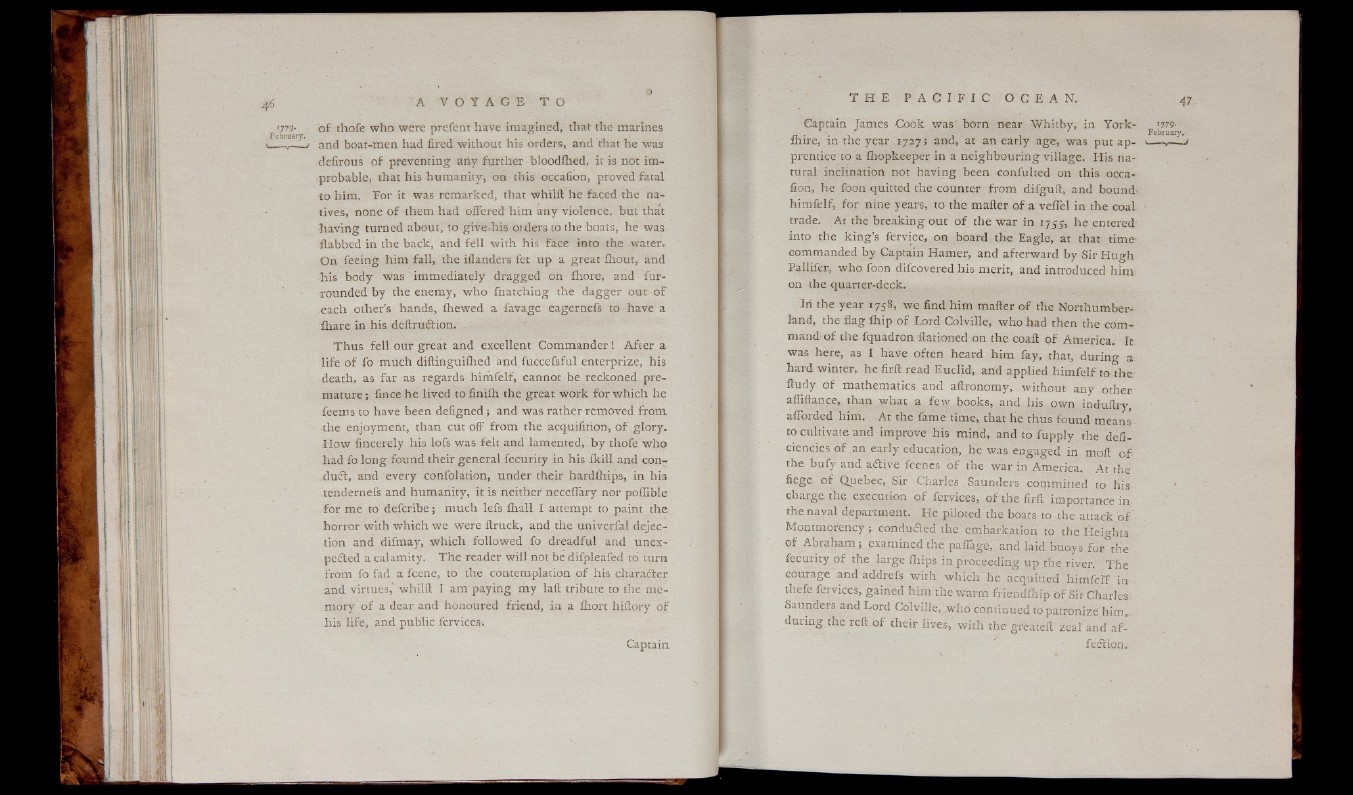
'779- o f thofe who were prefent have imagined, that the marines
February.
'__ ,---- i and boat-men had fired without his orders, and tiiat he was
defirous o f preventing any fu r th e r bloodfhed, it is not im probable,
that his humanity, on this occafion, proved fatal
to him. For it was remarked, that whilft he faced the n a tives,
none o f them had offered h im any violence, bu t that
h a v in g turned about, to g iv e .h is orders to the boats, he was
ftabbed in the back, and fe ll w ith his face into the water.
On fee ing h im fa ll, the iflanders fet up a great ihout, and
his body was immediately dragged on ihore, and furrounded
b y the enemy, w h o fnatching the d a gg er out o f
each other’s hands, fhewed a favage eagernefs to have a
ihare in his deftrucition.
T h u s fe ll our great and excellent Commander ! A fte r a
life o f fo much diftinguiihed and fuccefsful enterprize, his
death, as far as regards him fe lf, cannot be reckoned premature
; fince he lived to finiih the great w ork fo r w h ich he
feems to have been defigned ; and was rather removed from,
the enjoyment, than cut off from the acquifition, o f glo ry.
H ow fincerely his lofs was fe lt and lamented, b y thofe who
had fo long found their general fecurity in his fk ill and cond
u it , and every confolation, under their hardfhips, in his
tendernefs and humanity, it is neither neceifary nor poifible
fo r me to defcribe ; much lefs lh a ll I attempt to paint the
horror with w h ich we were ilru ck, and the univerfal dejection
and difmaÿ, w h ich follow ed fo dreadful and unex-
peéted a calamity. T h e reader w ill not be difpleafed, to turn
from fo fad a fcene, to the contemplation o f his character
and virtues,' whilft I am payin g my laft tribute to the memory
o f a dear and honoured friend, in a ihort hiftory o f
his life , and public fervices-.
Captain
Captain Tames C o o k w a s ’ born near Wh itb y, in York- '779-
n • -« t F eb ru a ry ,-
Ihire, in the year 1727; and, at an early age, was put ap- v— v—_j
prentice to a fhopkeeper in a n eigh bou rin g villa g e . His natural
inclination not ha vin g been confulted on this occa-
fion, he foon quitted the counter from difguft, and bound,
him fe lf, fo r nine years, to the mailer o f a veifel in the coal
trade. At the b re a k in g out o f the war in 1755, he entered
into the k in g ’s fervice, on board the Eagle, at that time-
commanded by Captain Hamer, and afterward b y Sir H u gh
Pallifer, who foon difcovered his merit, and introduced him
on the quarter-deck.
In the year 1758, we find him mailer o f the Northumberland,
the flag ihip o f Lord Colville, who had then the command
o f the fquadron ftationed on the coaft o f America. It
was here, as I have often heard h im fay , that, d u r in g a,
hard winter, he firft read Euclid, and applied h im fe lf to the
ftudy o f mathematics and aftronomy, without any other
affiftance, than w hat a few books, and his own induftry,
afforded him. At the fame time, that he thus found means
to cultivate and improve his mind, and to fu p p ly the deficiencies
o f an early education, he was engaged in moft o f
the b u fy and aSiive fcenes o f the war in America. At the
fiege o f Quebec, Sir -Charles Saunders committed to his
charge the execution o f fervices, o f the firft importance in
the n aval department. He piloted the boats to the attack o f
Montmorency; co n d u c ed the embarkation to the Heights
o f Abraham ; examined the paffage, and laid buoys fo r the
fecurity o f the large ihips in,proceeding up the river. T he
courage and addrefs w ith w h ich he acquitted h im fe lf in
thefe fervices, gained him the warm friendfhip o f Sir Charles.
Saunders and Lord Colville, .who continued to patronize him,,
during the reft o f their lives, w ith the greateft zeal and a ffetftion.